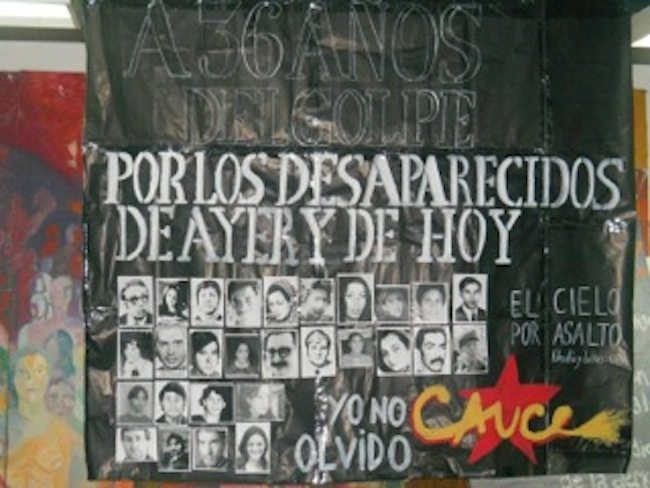On March 24, 1976 in Argentina, a military dictatorship took over. Today Argentines remember the ghosts of the disappeared and still try to make sense of it all. Hashtags such as #NuncaMás (Never Again) and #DiaDeLaMemoria have been trending on Twitter to knowledge those who disappeared 38 years ago.
Today in Argentina, we remember thousands who ‘disappeared’ during military dictatorship. Photos at ex-ESMA #NuncaMas pic.twitter.com/wlU3U3xACd
— Bridget M Gleeson (@bridgetglee) March 24, 2014
La ESMA, las torturas, los bebés nacidos en cautiverio, las desapariciones, las muertes, los libros y la música prohibidos #NuncaMás
— Ana Correa (@anaecorrea) March 24, 2014
(The ESMA, the tortures, the babies born in captivity, the disappearances, the deaths, the books and the prohibited music. Never Again)
Those who still disappear today, and suffer the consequences of violence, poverty, and injustice in the present, have also been added to the commemoration. Declared a national holiday, today thousands headed to Plaza de Mayo—a central political gathering spot in front of the presidential house in Buenos Aires where activists, citizens and students march every year. The older generations and the Mothers of Plaza de Mayo are still looking for their sons, daughters, and grandkids that disappeared, and asking for justice against the murderers. The younger generations commemorate this day, but have also added their own concerns about what #NuncaMás should represent.
For example, the students from the National Buenos Aires, a historically prestigious public school in the city, tweeted today:
Vamos a la Plaza por los 30.000 desaparecidos, pero también por los desaparecidos en democracia: por Luciano Arruga, por Jorge Julio López..
— Oktubre CNBA (@OktubreCNBA) March 24, 2014
(We are going to “the Plaza” for the 30.000 disappeared, but also for those who disappear in democracy: for Luciano Arruga, for Julio López).
Luciano Arruga was 16 when he disappeared in 2009. He was intercepted by police in Buenos Aires Lomas del Mirador, a low-income neighborhood in Buenos Aires Province, Argentina. So far, no policemen have been judged for this case, although family members claim policemen were beating him up before he disappeared. His sister Luciana Arruga declared in January 2014:
This keeps happening even in democracy. More than 4,000 young people have been murdered due to police violence or shootings. More than two hundred people have disappeared. I am not counting the women who disappear due to sex trafficking networks. So this is a problem of the present and the past. It is urgent we make visible the problem of violence because young people are getting killed in low income neighborhoods and we have to talk about real security.
In 2006, Julio Lopez. who survived the last Argentine military dictatorship, presented himself as a witness in the trial against military repressor and torturer Miguel Etchecolatz. The day he was supposed to show up to court in La Plata, he disappeared and no traces were left.
To the new generations, #NuncaMás means that we also don’t forget those who disappear during democracy.
Por @LucianoArruga por Julio Lopez. Por todos los desaparecidos en democracia. Porque sin ellos no hay NUNCA MÁS.
— Mila . (@cam_lagos) March 24, 2014
(For Luciano Arruga, for Julio Lopez. For all those disappeared in democracy. Because without them there is no NUNCA MÁS).
The women disappeared in democracy are also a pressing issue caused by the intersections of poverty, race, class, and patriarchy or machismo in Argentina. The popular site La Marcha released an article today expressing that we also need to say “Nunca Más” to current female trafficking and sexual exploitation:
Before, it was the activists who were killed. Now, women carry in their gender identity the failed marks of freedom and the uncompleted promise of their liberation. They live lives reduced to their bodies-simplified and objectified as consumption objects-young girls, teenagers; women are taken from poor neighborhoods. They are kidnapped and disappeared systematically by sex trafficking networks. For them, we also claim “Never Again.
A source from Argentina, who studies in the University of Buenos Aires and attended the 2012 march for the disappeared, explained to me today in an e-mail, that when she made the signs to promote #NuncaMás, her student group included the images of current disappeared along with those who disappeared in the past dictatorship.
There are also those who disappear today, and violence today. When we made the sign, we wanted to include the portraits of those disappeared in democracy such as Florencia Penachi, who disappeared through sex trafficking networks, and Luciano Arriaga.
***
Carolina Drake is a NYC-based writer and journalist from Argentina interested in intersectional feminisms and Latin America. She contributes to Latino Rebels, blogs, and Latin American Radar. You can follow her on Twitter. Interviews and references were conducted in Spanish and have been translated to English.




The anti-religious but, http://dokterpoker.org/app/img/peraturan.html above all, anti-Christian efforts which distinguish the present epoch have a character of concentration and universality which marks the stamp of the Jew, the supreme patron of the unification of peoples, because he is the cosmopolitan people par http://www.cintaberita.com excellence; because http://dokterpoker.org/app/img/jadwal.html the Jew prepares by license of the libre-pensÇe, the era called by him ‘Messianic’ – the day of his universal triumph. He attributes its near realization to the http://dokterpoker.org/app/img/promo.html principles spread by the philosophers http://www.cintaberita.com of the eighteenth century; the men at once unbelievers and cabalists, whose “http://dokterpoker.org/app/img/panduan.html work prepared the Judaising of the world. The character of universality will be noted in L’Alliance-isrÇlite-universelle, in the Universal Association of Freemasonry, and in the more recent auxiliaries, L’Alliance-universelle-religieuse, http://dokterpoker.orgopen to those who are still frightened off by the name of Israelite and finally in the Ligue-universelle de l’enseignement.